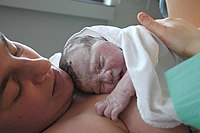
Photo from wikipedia
Abstract Background New recommendations regarding the use of personal protective equipment (PPE) during delivery have changed the maternal birth experience. In this study, we investigated the mental perceived impact of… Click to show full abstract
Abstract Background New recommendations regarding the use of personal protective equipment (PPE) during delivery have changed the maternal birth experience. In this study, we investigated the mental perceived impact of PPE use during delivery on the development of maternal postpartum depression (PPD) and post-traumatic stress symptoms (PTSS). Methods This was a multicenter, retrospective cohort study concerning women who delivered during the COVID-19 pandemic first lockdown period in Israel. Postpartum women were approached and asked to complete a comprehensive online questionnaire. Impact of PPE was graded on a scale of 1–5, and Impact of PPE ≥4 was considered high. PPD and PTSS were assessed using the EPDS and City BiTS questionnaires. Results Of 421 parturients, 36 (9%) reported high Impact of PPE. Parturients with high Impact of PPE had significantly higher PPD and PTSS scores)EPDS 8.4 ± 5.8 vs. 5.7 ± 5.3; City BiTS 9.2 ± 10.3 vs. 5.8 ± 7.8, p < 0.05 for both). Following adjustment for socio-demographic and delivery confounders and fear of COVID-19 (using Fear of COVID19 scale), Impact of PPE remained positively correlated with PPD symptoms (ß = 0.103, 95% confidence intervals [CI] 0.029–1.006, p = 0.038). Conclusion When examining the risk factors for developing postpartum PTSS—experiences during labor and PPE were found to be significant variables. As the use of PPE is crucial in this era of COVID-19 pandemic in order to protect both parturients and caregivers, creative measures should be taken in order to overcome the communication gap it poses.
Journal Title: European Psychiatry
Year Published: 2021
Link to full text (if available)
Share on Social Media: Sign Up to like & get
recommendations!